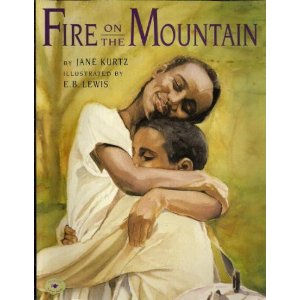

1. Could you tell us a little about your background and how you have come to have so many ties in Africa?
My parents moved to Ethiopia when I was two years old, and I spent almost all of my childhood in Ethiopia with only two visits to the US before I was in college. The only other African countries I set foot in were Egypt and the Sudan, but I thought of Ethiopia as home for most of my life until I was in my mid-twenties. When my parents left, my ties were severed suddenly. My brother and older sister made their ways back–to teach–but I didn’t return to Ethiopia for 20 years. In more recent years, I’ve done author visits in Uganda, Kenya, Nigeria, Ethiopia and done professional development with teachers in Ghana, Senegal, Kenya, and Botswana. I also edited a collection of short stories written by authors with connections all over Africa and read hundreds of pieces about Africa in the process.
2. How have you been influenced by African culture? Has it influenced your writing?
Ethiopian life was the sea I swam in for so many years that it’s actually hard for me to think well about the answer to that first question. Many of my books are an attempt to offer a glimpse into the beautiful land of my childhood–including FARAWAY HOME, TROUBLE, FIRE ON THE MOUNTAIN, THE STORYTELLER’S BEADS, and ONLY A PIGEON–but some bits of Ethiopia have made their way into most of my writing. Those sights, sounds, smells, tastes, and textures still are a rich source of details.
3. Can you think of anything we can learn about African culture through their folktales, such as the Anansi or Sasabonsam stories?
My father used to spend weeks camping out in remote parts of Ethiopia and listening to stories around the fire–he shared a lot of folktales with me when I was young. Cultural values are revealed in those tales. For instance, it’s easy to see that Ethiopia values cleverness (something that shows up in a lot of folktales from a lot of cultures). I became friends with Kofi, a man from Ghana who was in college at the University of North Dakota, where I taught for 10 years, and he told Anansi stories to my children and nephews when he came over for dinners on holidays. I spent a lot of time asking him questions about what it was like when he heard those stories–and I put some of those details into my book, IN THE SMALL SMALL NIGHT. Kofi made it clear that the tales he heard were the way that the adults of his world shared how people are to behave and what happens if they behave badly. Many of those stories had a specific didactic message. But the details of daily life are also revealed beautifully through folktales.
4. African artistry–music, dance, storytelling–have all had a profound influence in America. Do you see any of the characteristics of African storytelling in American folktales or music?
Some folktales such as FIRE ON THE MOUNTAIN have versions all around the world. TROUBLE is based on another story that pops up many places. It seems most countries have a silly folktale character that everyone can make people laugh–mostly affectionately. The Cinderella theme seems widespread. But honestly I’m no expert when it comes to these things.
5. You are involved with a non-profit organization called Ethiopia Reads which attempts to help give kids in Ethiopia access to children’s books. Could you tell us a little about that and how our readers could help?
I love volunteering with Ethiopia Reads because it reminds me of how special books are and what a treasure they can be. In Ethiopia, thousands of children learn to read without ever holding a book in class or at home. Libraries are almost nonexistant–what! A book you can borrow without having to pay? So we’ve been planting children’s libraries, mostly in schools but also in a place of dangerous streets for children and also in rural areas in carts pulled by donkeys. We’ve almost started book riots a few times. You can see some of the children’s faces on my blog, https://janekurtz.wordpress.com and at www.ethiopiareads.org Even small donations go a long way to ship books, buy local language books, support the Ethiopian staff that is doing professional development, and so on. Next fall, we’ll try a big Bring a Book Buy a Book campaign in schools and libraries and churches and community groups. I’d love for some readers to email me and ask for a kit about that.
Stay Up to Date!
Get the information you need to make wise choices about books for your children and teens.
Our weekly newsletter includes our latest reviews, related links from around the web, a featured book list, book trivia, and more. We never sell your information. You may unsubscribe at any time.
Support our writers and help keep Redeemed Reader ad-free by joining the Redeemed Reader Fellowship.
Stay Up to Date!
Get the information you need to make wise choices about books for your children and teens.
Our weekly newsletter includes our latest reviews, related links from around the web, a featured book list, book trivia, and more. We never sell your information. You may unsubscribe at any time.
FREE Bible Guide!
Get a guide to the Best Bibles for Children and Teens. Perfect for an Easter gift.
We'd love to hear from you!
Our comments are now limited to our members (both Silver and Golden Key). Members, you just need to log in with your normal log-in credentials!
Not a member yet? You can join the Silver Key ($2.99/month) for a free 2-week trial. Cancel at any time. Find out more about membership here.

